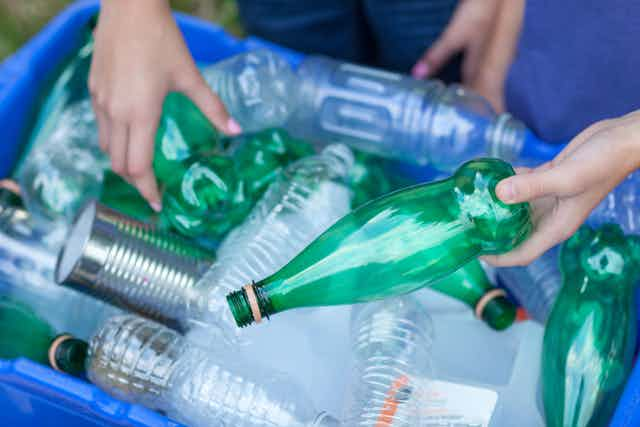When it comes to recycling, Hull City Council has threatened local households with the nuclear option: clean out your recyclable waste or we will take your bin away.
According to the council, 20% of the recyclable waste that it collects each year is contaminated, either by being placed in the wrong bin or because any remnants of food have not been washed off.
Instead of being recycled, the contaminated waste then has to be treated as general or residual waste and the council has to pay to dispose of it at landfills.
This costs the council £50,000 a month in landfill tax – which is currently set at £84.40 per tonne – and comes out of the council tax budget, which then reduces spending on other services.
The council has already removed over 2,000 bins from those households it believes to be “repeat offenders” and is now spending £100,000 on finding out how to reduce recycling contamination.
Right to waste disposal?
Residents have not reacted well to the warning from Hull Borough council. Some have said they will just throw recyclable waste into the general waste bin, while others have expressed anger that they are being treated like lawbreakers.
That said, out of the 16,000 households who have received letters from Hull council about incorrectly disposed of waste, only 2,150 continued to offend to the point of having their bins removed.
While it is not compulsory for households to recycle, it is a civil offence to not dispose of waste correctly, and “the offender” can be fined. But, from my own research, it is clear that councils prefer to use fines as a last resort – various London councils have threatened to fine residents for not disposing of waste correctly but none have actually issued a fine.
A rubbish journey
The UK is legally obliged under European Union rules to reduce the amount of waste sent to landfill. Failure to meet EU targets means that the UK can be required to pay a financial penalty. This can be passed onto any local authorities that have contributed to this failure by not diverting enough waste away from landfill. Where too much waste is sent to landfill, some local authorities have also taken the more controversial option of incineration.
Under international law, waste cannot be exported unless it is for the purposes of recycling. However, reported anecdotes have actually highlighted people somehow finding their own recyclable waste while on holiday. Whether this is an urban myth or true is difficult to tell, but the Department for Environment, Food and Rural Affairs – the government department responsible for UK waste policy – cannot be entirely certain as to whether waste exported for recycling is actually recycled.

Judging from reports of council workers having to contend with leftover baked beans in the bottom of tins, Hull appears to be using a co-mingled or mixed dry recycling collection. As the name suggests, this is where households can place all recyclable waste into one bin – in Hull’s case, a blue one, but for other local councils it may be a green bin or a different type of box or container.
Fully co-mingled recycling collections are arguably convenient from a household perspective and this has encouraged greater volumes. However, the Waste Resources Action Programme has found that co-mingled collections tend to result in more recyclable waste being rejected by the recycling company because of contamination. So even if we put waste out for recycling, it may not actually be recycled.
One solution for councils is to opt for kerbside sorting. Since 2015, EU law has indicated a preference for kerbside sorting. While policymakers may be amenable to it, the problem is that households can be more resistant, presumably because it requires more work.
Saving money
In 2009, the Royal Borough of Windsor and Maidenhead introduced an incentivised scheme, in partnership with US company Recyclebank, whereby households were given reward points for recycling. The points earned could be redeemed for vouchers for use in local businesses. The take-up under the scheme in the first year was 74%.
Halton Borough Council, in Runcorn, saw similar results – the number of households recycling increased by 18% and households that participated in the scheme produced 60% more recyclable waste.
Residents, who received the reward points, felt as if they were receiving a pat on the back. Which goes to show that a perceived “reward” can go a long way towards boosting uptake.
But such incentive schemes can be relatively expensive. For Halton Council, it cost £144,000 a year and when funding was cut, the reward scheme was axed. Windsor and Maidenhead have only been able to continue offering recycling rewards because the Department for Communities and Local Government provides funding, although that comes with conditions, such as providing a weekly collection. Plus, people become acclimatised to incentives, so in order to maintain performance, incentives have to keep increasing.
It is clear that when it comes to recycling, we still have a lot to learn. Last year, in England, 338,000 tonnes of recyclable waste was thrown away, an increase of 84% from 2012. That’s the equivalent of around £28m in landfill tax – a lot of money that could be used to fund incentive schemes or other council services.
So when Hull council takes a drastic action, such as removing residents bins, it is because so much depends on households doing their fair share. After all, one man’s (or woman’s) waste is another man’s treasure.

